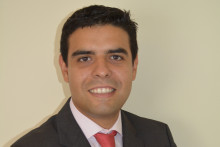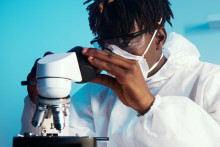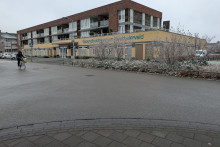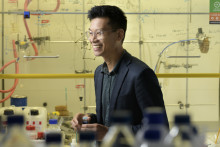Jimmy Faria Albanese, Associate Professor at Faculty of Science and Technology, is one of the two UT researchers who received the Vidi grant of 800,000 euros this year. He will use the funding for his project Foams for Catalytic Upcycling of Plastics (FoCUs), which aims to contribute to a better recycling of plastics.
With his group Multiphasic Catalysis and Reactions (MCR), the UT scientist develops novel catalytic materials for the sustainable production of renewable energies and chemicals. ‘Catalysts are particles that increase the rate of a chemical reaction, they can change a molecule in a very fast way,’ explains Faria Albanese. ‘We apply this in the context of the nitrogen cycle – activation of nitrogen to make ammonia for fertilizers and fuels. Ammonia happens to be an excellent hydrogen storage material. We also work in the carbon cycle by making more circular the production of chemicals using biomass. We work on understanding how the reactions in these two branches work. They require intimate contact between solids and molecules in the liquid and gas phases, and so we can definitely talk about multiphasic catalysis.’
Chemical recycling
The focus of his Vidi project is slightly different. ‘A couple of years ago, I started looking at the issue of plastic pollution,’ says the researcher. ‘It became clear to me that it’s a tremendous challenge. Out of all plastic waste generated every year, 9% is recycled, 12% is incinerated and the rest is sent to landfills. Plastics have been found everywhere – in guts of fish, on Mt Everest and in the Mariana Trench, the deepest oceanic trench on Earth. More recently plastics have been found in the lungs and blood of healthy individuals.’
'Plastics have been found everywhere'
Thinking about this challenge, Faria Albanese realized that there might be a solution involving his field of expertise. ‘We could use catalytic hydrocracking: breaking plastic molecules into smaller ones using a catalyst and hydrogen,’ he says. ‘By doing so, we can transform the plastic macromolecules into new molecules of higher value. Essentially, we will be doing chemical recycling.’
Foams
‘We already know that we can use hydrogen and catalysts to breakdown the plastic macromolecule,’ continues the scientist. ‘However, that process now takes a very long time, limiting its industrial scalability. My idea is to improve it by using foams. This should allow us to make the reactions in a very fast and controlled manner. With my Vidi, I aim to tackle the carbon cycle. We hope that this knowledge can then be used to improve other reactions relevant for the nitrogen cycle.’
The dream is to make a process that can be run at a small and large scale, adds Jimmy Faria Albanese. ‘We need solutions that can be distributed as well as centralized. By the end of the Vidi project, I want to have materials and blueprints of how a pilot could look. I’d like to have data to design a reactor and continue with the research further. We need to start working on this as soon as possible. We need to be very fast and I’m really looking forward to starting the research.’
Humbling moment
Receiving the Vidi grant meant a great deal to the UT scientist. ‘It was a very emotional and humbling moment for me. I honestly didn’t expect it. I’ve had so many tries at so many grants, it has been a rollercoaster. For me, getting the Vidi is not about the prestige, it’s about the effort that it took to achieve it. I come from Venezuela, I studied in the U.S., it has been a long journey. I’ve been an outsider, so this is a very rewarding feeling. I’m very appreciative and thankful for this fantastic opportunity.’
'There should be a lot more Vidi’s'
‘I’d also like to say,’ adds Jimmy Faria Albanese. ‘In the Dutch academic environment, the standards are really high. Everyone is doing excellent research and I’m very proud to be part of the community. Scientists here are so talented and working very hard. There should be a lot more Vidi’s!’







